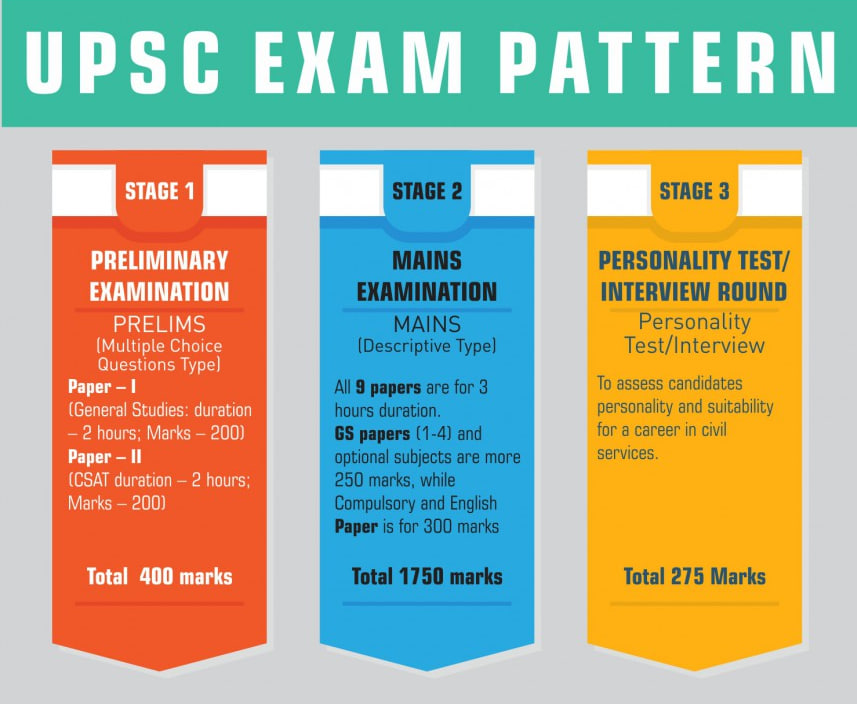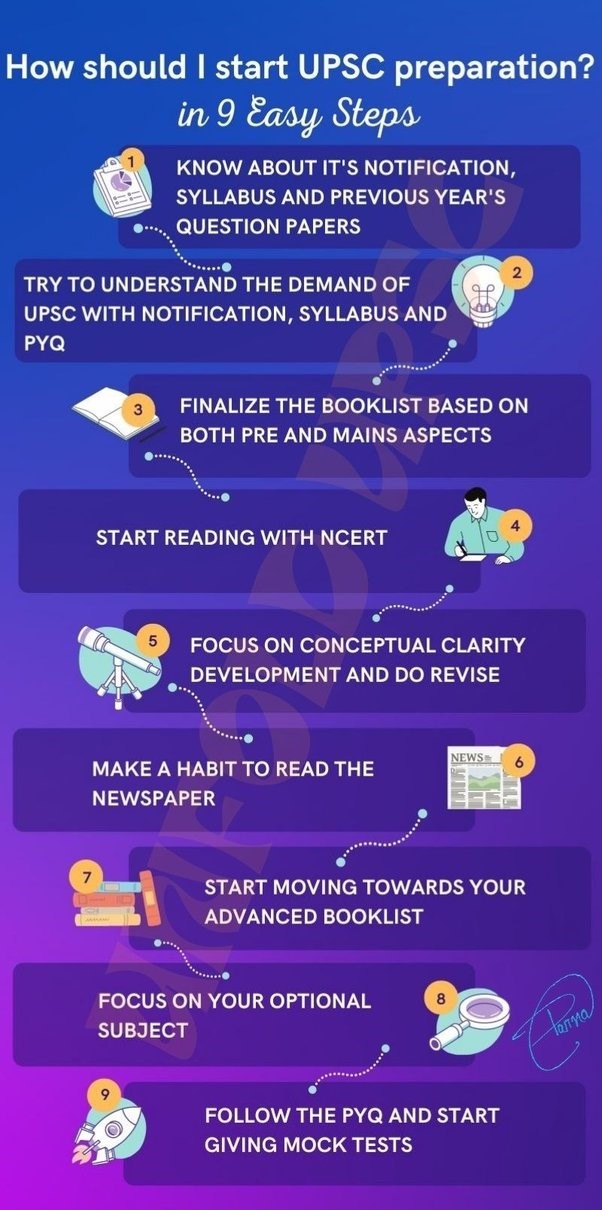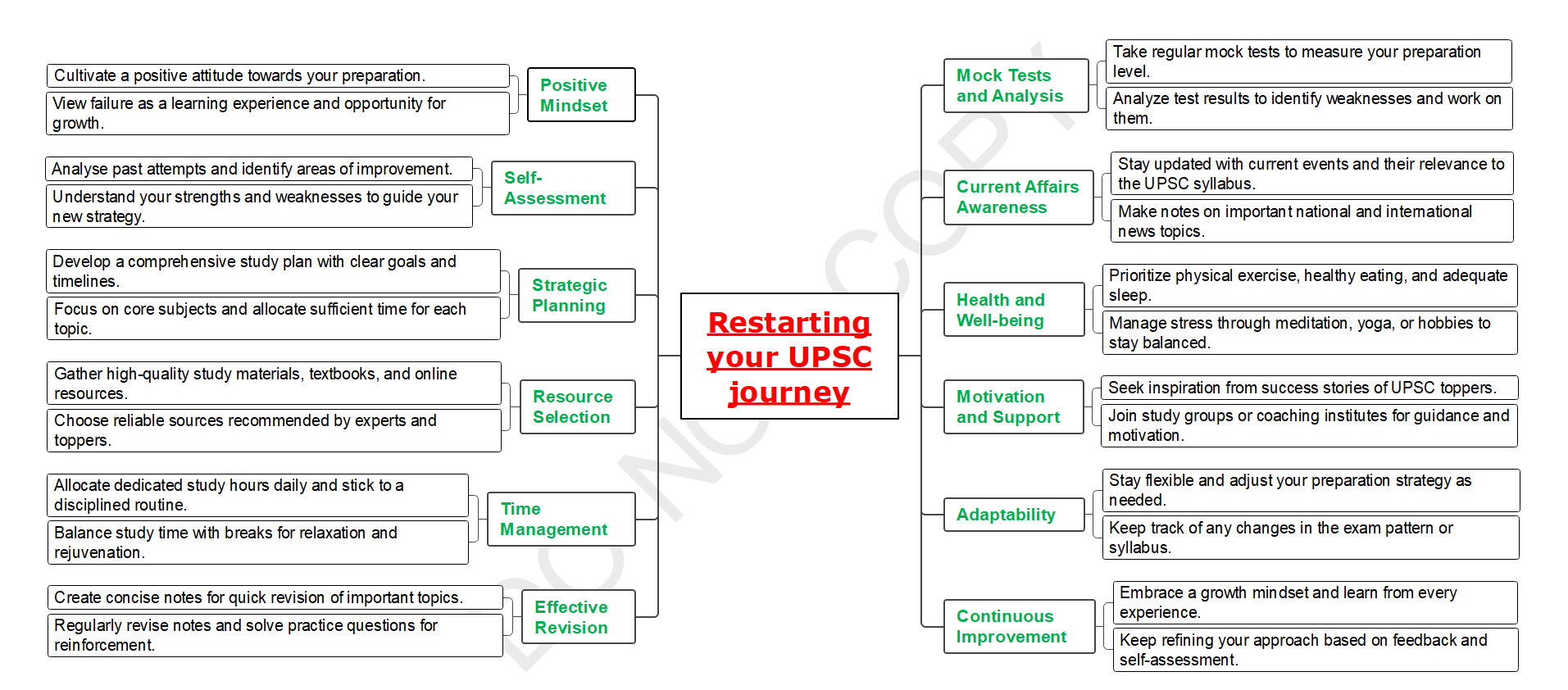RESTARTING YOUR UPSC JOURNEY

The UPSC Civil Services Exam (CSE) is a prestigious exam in India, with millions of candidates competing for a desirable position in the bureaucracy each year. The process of becoming an IAS officer is difficult, requiring consistent dedication, discipline, and the capacity to handle pressure. Even the most intelligent and efficient candidates may experience setbacks along the way. A failed attempt, while definitely discouraging, does not have to mean the end of your UPSC dream. Instead, it can be a transforming event, providing crucial insights while moving you ahead with fresh focus and determination. By addressing this challenge with the right viewpoint and a willingness to learn and adapt, you can use this experience to improve your strategy and emerge stronger in your next attempt.
A detailed guide to help you Restart your UPSC journey with renewed focus and determination
- The UPSC examination is known for its rigorous nature and high competition, making the preparation process challenging yet rewarding for aspirants aiming to serve the nation through civil services. Restarting after setbacks or delays requires a strategic approach including self-assessment, goal setting, structured study planning, seeking guidance, and maintaining motivation throughout the journey.
Introspection and Analysis
- Acknowledge Your Emotions: It's normal to feel a range of emotions after a setback, including disappointment, anger, frustration, or even self-doubt. Allow yourself to feel these emotions, but don't dwell on them for too long. Acknowledge your feelings, and then shift your focus to a growth mindset. Reframe your experience as a learning opportunity.
- Analyze Your Performance: Conduct a thorough analysis of your results. This might involve reviewing your UPSC marksheet, question papers, and answer copies (if available). Identify your strengths and weaknesses in each subject (prelims, mains, and interviews). Were there specific topics you underperformed in? Did your answer writing lack depth or structure? Be honest with yourself about the areas that require improvement.
- Seek Guidance: Don't be afraid to seek guidance from mentors, successful aspirants, or educators. A fresh perspective can be invaluable in helping you identify areas for improvement. Discuss your performance with someone who can provide objective feedback and suggest strategies for improvement. Talking to someone who has been through the UPSC journey themselves can also provide valuable insights and motivation.

Revamping Your Strategy
|
Revisit Your Study Plan
|
●Carefully analyze your previous study plan. Did it lack a clear structure? Did you spend too much time on irrelevant topics that are no longer part of the syllabus? Revamp your plan to address these shortcomings.
●Ensure your new plan aligns with your strengths and weaknesses, and follow the latest UPSC syllabus. Focus on covering the high-yield topics first, and gradually progress to more complex areas
|
|
Explore New Resources
|
●The UPSC exam is constantly evolving. There might be new study materials, online courses, or coaching institutes that have emerged since your last attempt. Research these resources and identify ones that align with your learning style and address your specific weaknesses. Experiment with different resources to find what works best for you.
|
|
Prioritize Answer Writing Practice
|
●Answer writing is a crucial skill for success in the UPSC CSE. Regularly engaged in answer writing practice, simulating exam conditions as closely as possible. Set aside dedicated time slots for answer writing, and adhere to the prescribed word limit.
●Focus on developing a clear and concise writing style, presenting well-structured arguments supported by relevant facts and examples.
●Once you've completed your answers, get them evaluated by a qualified source, such as a mentor, educator, or experienced aspirant. Their feedback will help you identify areas for improvement in your writing style, content organization, and time management.
|
|
Focus on Current Affairs
|
●The UPSC CSE heavily emphasizes the candidate's understanding of contemporary issues. Stay updated with current events by developing a habit of reading newspapers, magazines, and credible online sources.
●Focus on in-depth analysis rather than just skimming headlines. Look for ways to integrate current affairs into your answers whenever possible. This will demonstrate your awareness of current issues and your ability to apply your knowledge to real-world scenarios.
|
|
Time Management is Key
|
●The UPSC CSE is a race against time. You'll need to complete a vast syllabus and practice a significant number of mock tests within a limited timeframe.
●Develop strong time management skills to ensure you can effectively manage your studies. Create a daily or weekly schedule that allocates specific time slots for studying different subjects, answer writing practice, and revision.
●Be realistic about how much you can accomplish in a given timeframe, and avoid scheduling yourself for overload. Utilize time management techniques to maintain focus and avoid burnout.
|
Develop a Growth Mindset
Shift your perspective from "failure" to "learning experience." Every setback holds valuable lessons. Here's how to cultivate a growth mindset:
- Focus on the process, not just the outcome: Celebrate small wins and milestones along the way. Acing a difficult topic, completing a revision cycle, or scoring well in a mock test are all victories worth acknowledging. These small wins will motivate you to keep pushing forward.
- View challenges as opportunities to learn and improve. Did you struggle with a particular concept? Don't be discouraged. Approach it with renewed determination, seek additional resources, or consult a mentor. Remember, the stronger your foundation, the better equipped you'll be to tackle complex topics later on.
- Develop resilience: Don't let setbacks define you. Learn from them and move forward with even greater determination. Everyone faces challenges, but successful individuals are those who bounce back from setbacks with a growth mindset. Develop a mental strength that allows you to learn from your mistakes. Remember, failure is not the opposite of success; it's part of the learning process.

Additional Tips for Cultivating a Growth Mindset
- Surround yourself with positive influences: Seek out mentors, friends, and fellow UPSC aspirants who share your goals and will support you on your journey. Their encouragement and positive attitude can be helpful. Look for people who will celebrate your successes, no matter how small, and offer constructive criticism to help you improve. Share your struggles with them and learn from their experiences as well. Building a strong support network can make a world of difference in your UPSC journey.
- Focus on effort, not ability: Believe that your abilities can be developed through hard work and dedication. Rather than thinking "I'm not good at this," tell yourself "I'm still learning, and I'm getting better every day." Focus on the process of learning and improvement, rather than getting discouraged by setbacks. Celebrate the effort you put in to learn a new concept or improve your answer writing skills. This will help you stay motivated and persistent in your preparation.
- Celebrate effort: Acknowledge the hard work you put in, not just the outcome. This will help you stay motivated during challenging times. When you face a setback, take a moment to reflect on the effort you've invested so far. Acknowledge the progress you've made and the challenges you've overcome. This will give you the strength to keep moving forward, even when the going gets tough. Remember, the UPSC journey is a marathon, not a sprint. There will be ups and downs along the way. But by focusing on your effort and perseverance, you can stay motivated and on track to achieve your goals.

Staying Motivated Throughout the Journey
- Find your inspiration: Read about the journeys of successful UPSC aspirants. Surround yourself with positive and supportive people who believe in your dream. UPSC preparation can be isolating at times, so having a strong support system is crucial. Look for mentors who can guide you through the process and fellow aspirants who can understand the challenges you face.
- Set realistic goals: Break down your preparation into smaller, achievable milestones. Don't get discouraged if you don't ace every single mock test or if you take longer to grasp a certain concept. Celebrate your successes, however small. Completing a challenging chapter, scoring well on a topic you previously struggled with, or sticking to your study schedule for a week are all victories worth acknowledging. Reward yourself for these accomplishments to keep yourself motivated.
- Maintain a healthy lifestyle: Ensure you get adequate sleep (7-8 hours per night is ideal), eat nutritious meals that fuel your body and mind, and exercise regularly. A healthy mind and body are crucial for sustained effort. Plan your study schedule around your sleep cycle and include breaks for physical activity and relaxation. Taking care of your physical and mental well-being will help you stay focused and energized throughout your preparation.
- Focus on the bigger picture: Remind yourself why you started this journey in the first place. Visualize yourself achieving your dream of serving the nation as a UPSC officer. Having a clear vision of your goals will help you stay motivated during challenging times. When you feel demotivated, revisit your initial motivation and remind yourself of the positive impact you can make through a career in civil service.
Conclusion
- Restarting your UPSC journey is a transformative process that requires introspection, strategic planning, and unwavering determination. By reflecting on past experiences, setting clear goals, seeking guidance, and embracing effective strategies, you can navigate this demanding yet rewarding path towards success. Remember that every setback is an opportunity for growth, and every step forward brings you closer to realizing your aspirations of serving the nation through civil services.







